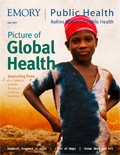Why Vaccine Compliance Matters

Saad Omer aims to increase vaccine compliance to prevent childhood diseases.
Those who refuse put others at risk of disease
By Ashante Dobbs
An outbreak of measles in the state of Washington last year sickened 19 children. Of those who fell ill, 18 had something in common—they were not vaccinated.
For RSPH researcher Saad Omer, the Washington outbreak is a perfect example of the effect on an entire community when individuals are unimmunized. His research aims to shed light on ways to encourage increased vaccine compliance for adults and their children.
"Vaccine-preventable diseases such as measles, influenza, and pertussis often start among persons who forego vaccinations, spread rapidly within unvaccinated populations, and also spread to other subpopulations," says Omer, assistant professor of global health in the RSPH and an affiliate faculty member of the Emory Vaccine Center. "Everyone benefits from vaccines."
In a recent New England Journal of Medicine article, Omer and his colleagues reviewed evidence from several states showing that vaccine refusal due to nonmedical reasons puts children in communities with high rates of refusal at higher risk for infectious diseases such as measles and whooping cough.
Even children whose parents do not refuse vaccination are put at risk because "herd immunity" normally protects children who are too young to be vaccinated, who can't be vaccinated for medical reasons, or whose immune systems do not respond sufficiently to vaccination.
"Research findings indicate that everyone who lives in a community with a high proportion of unvaccinated individuals has an elevated risk of developing a vaccine-preventable disease," says Omer.
In addition to his work on vaccine refusals, Omer is looking at the impact on infants of immunizing their mothers against seasonal flu. A clinical trial in Bangladesh, in which mothers were vaccinated for flu, showed promise in protecting their infants, who were too young to be vaccinated. His work there has important implications not just for mothers and young children in developing countries but also for those in developed countries such as the United States because there is no approved vaccine for infants younger than 6 months.
"People don't realize that flu kills," says Omer. "Even seasonal flu kills, and the elderly and very young are especially at risk."
Omer trained as a physician in Pakistan and taught at Johns Hopkins, where he participated in studies in Africa and Asia related to HIV in mothers and infants.
Upon joining the RSPH last year, he received a Faculty Distinction Fund Award from the Emory Global Health Institute. These awards help bring scholars to Emory who are intent on developing successful global health programs. This year, he received the Maurice R. Hilleman Early-Stage Career Investigator Award from the National Foundation for Infectious Diseases, named for the late microbiologist who contributed to the development of several vaccines still in use today.
"Vaccines are one of the most effective tools available for preventing disease in humans, particularly children," says Omer. "Maintaining high levels of vaccine coverage will ensure that we maintain gains already made to eradicate important childhood diseases."


